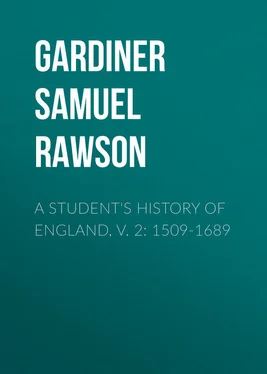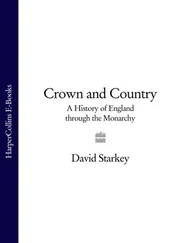Samuel Gardiner - A Student's History of England, v. 2 - 1509-1689
Здесь есть возможность читать онлайн «Samuel Gardiner - A Student's History of England, v. 2 - 1509-1689» — ознакомительный отрывок электронной книги совершенно бесплатно, а после прочтения отрывка купить полную версию. В некоторых случаях можно слушать аудио, скачать через торрент в формате fb2 и присутствует краткое содержание. Издательство: Иностранный паблик, Жанр: История, foreign_antique, foreign_prose, на английском языке. Описание произведения, (предисловие) а так же отзывы посетителей доступны на портале библиотеки ЛибКат.
- Название:A Student's History of England, v. 2: 1509-1689
- Автор:
- Издательство:Иностранный паблик
- Жанр:
- Год:неизвестен
- ISBN:нет данных
- Рейтинг книги:3 / 5. Голосов: 1
-
Избранное:Добавить в избранное
- Отзывы:
-
Ваша оценка:
- 60
- 1
- 2
- 3
- 4
- 5
A Student's History of England, v. 2: 1509-1689: краткое содержание, описание и аннотация
Предлагаем к чтению аннотацию, описание, краткое содержание или предисловие (зависит от того, что написал сам автор книги «A Student's History of England, v. 2: 1509-1689»). Если вы не нашли необходимую информацию о книге — напишите в комментариях, мы постараемся отыскать её.
A Student's History of England, v. 2: 1509-1689 — читать онлайн ознакомительный отрывок
Ниже представлен текст книги, разбитый по страницам. Система сохранения места последней прочитанной страницы, позволяет с удобством читать онлайн бесплатно книгу «A Student's History of England, v. 2: 1509-1689», без необходимости каждый раз заново искать на чём Вы остановились. Поставьте закладку, и сможете в любой момент перейти на страницу, на которой закончили чтение.
Интервал:
Закладка:
20. Archbishop Cranmer and the Court at Dunstable. 1533.– Henry found a convenient instrument for his personal as well as for his national policy in Thomas Cranmer, whom he appointed Archbishop of Canterbury in the spring of 1533. Cranmer was intellectually acute, and took a worthy part in the further development of the English Church; but he was morally weak, and inclined to carry out orders whatever they might be, especially if they came from a king as strong-willed as Henry. He had already thrown himself as an active agent into the cause of Henry's divorce, and he was now prepared as archbishop to give effect to his arguments. In March Convocation was half persuaded, half driven to declare Catharine's marriage to be void, and in May Cranmer, sitting at Dunstable in his archiepiscopal court, pronounced sentence against her. In accordance with the Act of Appeals the sentence was final, but both Henry and Cranmer feared lest Catharine should send her counsel to make an appeal to Rome, and they were therefore mean enough to conceal from her the day on which sentence was to be given. The temporal benefits which the Pope derived from England were now to come to an end as well as his spiritual jurisdiction, and in July the king ratified the Act of Annates.
21. Frith and Latimer. 1533.– When a man of special intellectual acquirements like Cranmer could descend to the trick which he had played at Dunstable, it was time that some one should be found who, in the steadfastness of his faith, would refuse to truckle to the king, and would maintain the rights of individual conscience as well as those of national independence. The teaching of Zwingli, a Swiss reformer, who held that the bread and wine in the Sacrament of the Lord's Supper was a mere sign of the Body and Blood of the Redeemer, was beginning to influence the English Protestants, and its reception was one more reason for the mass of Englishmen to send to prison or the stake those who maintained what was, in their eyes, so monstrous a heresy. Amongst the noblest of the persecuted was John Frith, who whilst he stoutly held to the belief that the doctrine of transubstantiation was untrue, begged that men should be left 'to think thereon as God shall instil in any man's mind, and that neither part condemn other for this matter, but receive each other in brotherly love, reserving each other's infirmity to God.' Frith was in advance of his time as the advocate of religious liberty as well as of a special creed, and he was burnt alive. Henry meant it to be understood that his supreme headship made it easier, and not harder, to suppress heresy. He might have succeeded if he had had merely to deal with a few heroes like Frith. That which was beyond his control was the sapping process of the spirit of the Renascence, leading his bishops, and even himself, to examine and explain received doctrines, and thus to transform them without knowing what they were doing. Hugh Latimer, for instance, a favourite chaplain of the king, was, indeed, a preacher of righteousness, testing all things rather by their moral worth than by their conformity to an intellectual standard. The received doctrines about Purgatory, the worship of the saints, and pilgrimages to their images seemed to him to be immoral; but as yet he wished to purify opinion, not to change it altogether, and in this he had the support of the king, who, in 1535, made him Bishop of Worcester.
22. Completion of the Breach with Rome. 1533-1534.– Before 1533was over Henry appealed from the Pope to a General Council. Clement not only paid no heed to his appeal, but gave sentence in favour of Catharine. When Parliament met in 1534, therefore, Henry was obliged to strengthen his position of hostility to the Pope. He procured from it three Acts. The first of these was a second Act of Annates, which conferred on him absolutely not only the first-fruits of bishoprics which had been the subject of the conditional Act of Annates in 1532(see p. 388), but also the first-fruits of all the beneficed clergy, as well as a tenth of each year's income of both bishops and beneficed clergy, all of which payments had been hitherto made to the Pope. Incidentally this Act also regulated the appointment of bishops, by ordering that the king should issue a congé d'élire to the chapter of the vacant see, together with a letter missive compelling the choice of his nominee. The second was an Act concerning Peter's pence, abolishing all minor payments to the Pope, and cutting away all interference of the Pope by transferring his right to issue licences and dispensations to the Archbishop of Canterbury. The third confirmed the submission of the clergy and enacted that appeals from the courts of the Archbishop should be heard by commissioners appointed by the King, and known as the delegates of Appeals. It was by these Acts that the separation between the Churches of England and Rome was finally effected. They merely completed the work which had been done by the great Act of Appeals in 1533. The Church of England had indeed always been a national Church with its own ecclesiastical assemblies, and with ties to the Crown which were stretched more tightly or more loosely at various times. It had, however, maintained its connection with the Continental Churches by its subordination to the Pope, and this subordination had been made real by the subjection of its courts to appeals to Rome, and by the necessity of recurring to Rome for permission to do certain things prohibited by English ecclesiastical law. All this was now at an end. The old supremacy of the king was sharpened and defined. The jurisdiction of the Pope was abolished. Nominally the English ecclesiastical authorities became more independent; more capable of doing what seemed to them to be best for the Church of the nation. Such at least was the state of the law. In practice the English ecclesiastical authorities were entirely at Henry's bidding. In theory and in sentiment the Church of England was still a branch of the Catholic Church, one in doctrine and in discipline with the Continental Churches. Practically it was now, in a far more unqualified sense than before, a national Church, ready to drift from its moorings and to accept new counsels whenever the tide of opinion should break strongly upon it.
CHAPTER XXVI
THE ROYAL SUPREMACY. 1534-1547
• The Acts of Succession and Supremacy 1534
• Execution of Fisher and More 1535
• Dissolution of the smaller monasteries and the Pilgrimage of Grace 1536
• Destruction of relics and images 1538
• The Six Articles and the Act granting to the king the greater monasteries 1539
• Fall of Cromwell 1540
• Henry VIII. king of Ireland 1541
• Solway Moss 1542
• Death of Henry VIII. 1547
1. The Act of Succession. 1534.– In September 1533Anne had given birth to a daughter, who was afterwards Queen Elizabeth. In 1534Parliament passed an Act of Succession. Not only did it declare Anne's marriage to be lawful and Catharine's unlawful, and consequently Elizabeth and not Mary to be heir to the crown, but it required all subjects to take an oath acknowledging their approval of the contents of the Act. More and Fisher professed themselves ready to swear to any succession which might be authorised by Act of Parliament; but they would not swear to the illegality of Catharine's marriage. It was on this point that Henry was most sensitive, as he knew public opinion to be against him, and he threw both More and Fisher into the Tower. In the year before the language held in the pulpit on the subject of Henry's marriage with Anne in his wife's lifetime had been so strong that Cranmer had forbidden all preaching on the subject of the king's laws or the succession to the throne. Of the clergy, the friars were still the most resolute. Henry now sent commissioners to visit the friaries, and those in which the oath was refused were summarily suppressed.
Читать дальшеИнтервал:
Закладка:
Похожие книги на «A Student's History of England, v. 2: 1509-1689»
Представляем Вашему вниманию похожие книги на «A Student's History of England, v. 2: 1509-1689» списком для выбора. Мы отобрали схожую по названию и смыслу литературу в надежде предоставить читателям больше вариантов отыскать новые, интересные, ещё непрочитанные произведения.
Обсуждение, отзывы о книге «A Student's History of England, v. 2: 1509-1689» и просто собственные мнения читателей. Оставьте ваши комментарии, напишите, что Вы думаете о произведении, его смысле или главных героях. Укажите что конкретно понравилось, а что нет, и почему Вы так считаете.












